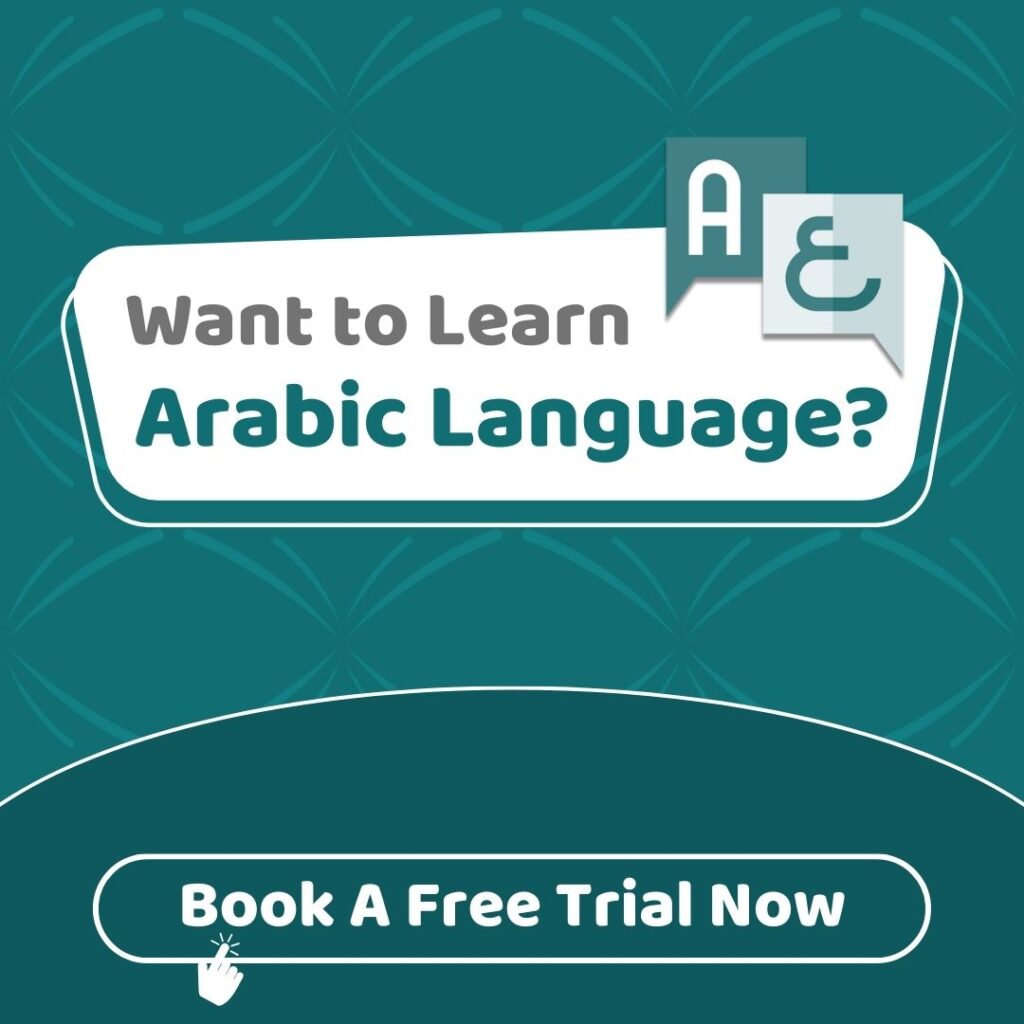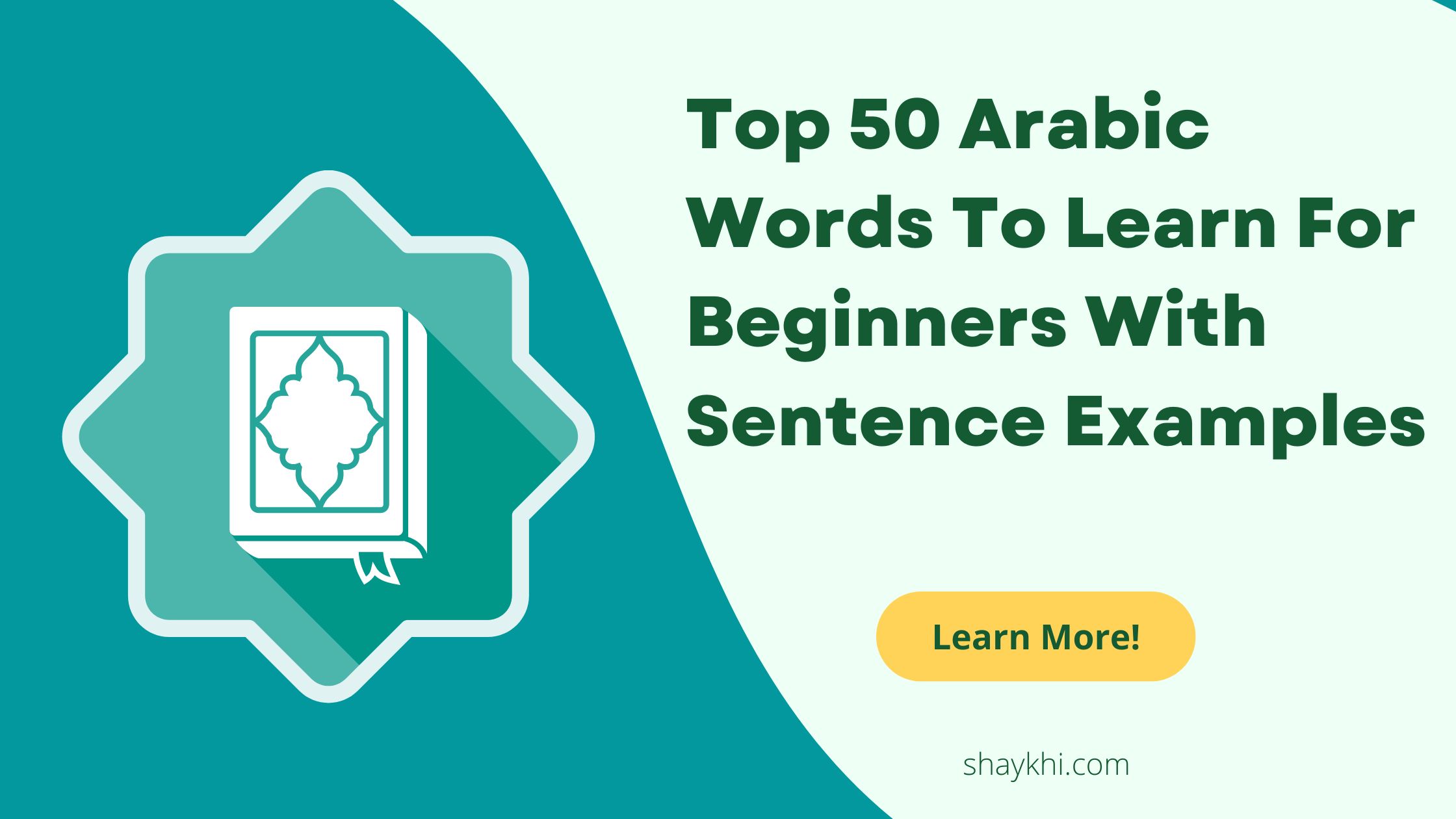This article explores 50 easy Arabic words, providing examples to help learners integrate these terms into everyday conversation.
Learning Arabic, one of the world’s most widely spoken and culturally rich languages, opens the door to understanding a diverse and historically significant part of the world.
Whether you’re looking to enhance your travels, deepen your religious knowledge, or expand your cognitive abilities, mastering key Arabic words is an essential first step.
Why Is It Important to Find Arabic Words to Learn?
Learning Arabic words is important, which leads many individuals from different cultural backgrounds to attempt to find Arabic words to learn gradually in order to build a rich Arabic language. Among these points of importance are the following:
1. Cultural Understanding
Arabic is spoken by over 420 million people worldwide, making it one of the most widely spoken languages. By learning Arabic words, you gain insights into the cultures, traditions, and values of the Arabic-speaking world, fostering better communication and mutual respect.
2. Religious Significance
For Muslims, Arabic holds special importance as it is the language of the Quran, the holy book of Islam. Learning Arabic words and enrolling in a Quranic Arabic course such as Shaykhi Academy’s can help in understanding religious texts, prayers, and practices more deeply.
3. Travel and Communication
If you plan to travel to an Arabic-speaking country, knowing basic Arabic words can significantly enhance your experience. It helps in navigating daily interactions, understanding signs, and connecting with locals, making your travels more enjoyable and meaningful.
4. Business and Career Opportunities
Arabic is a critical language in international business, especially in regions like the Middle East and North Africa (MENA). Knowing Arabic words can give you a competitive edge in industries such as oil, finance, diplomacy, and translation, opening up career opportunities.
5. Cognitive Benefits
Learning new languages, including Arabic, improves cognitive abilities such as problem-solving, memory, and multitasking. It also enhances your understanding of linguistic structures and broadens your intellectual horizons.
6. Enhancing Communication
Even if you’re not fluent in Arabic, knowing a few keywords can bridge communication gaps and show respect for the language and culture of Arabic speakers. It can lead to more meaningful conversations and connections. One can learn such words in Arabic language courses such as the MSA course at Shaykhi Academy.
7. Academic and Intellectual Growth
Arabic is a language with a rich history and a vast body of literature, including scientific, philosophical, and literary works. Learning Arabic words opens the door to accessing these resources in their original form, enriching your academic and intellectual pursuits.
8. Personal Fulfillment
Mastering new words in Arabic can be personally rewarding. It gives you a sense of accomplishment and boosts your confidence as you expand your language skills.
What Are Basic Arabic Vocabulary to Learn?
There are many basic Arabic vocabulary words that are worth learning. Usually, the tutors of the general Arabic language course at Shaykhi Academy teach many of these words, for their ability to facilitate their communication with Arabs and ease their journey of learning the Arabic language, including:
| The Arabic Word | Its Pronounciation | Its Meaning | An Example |
| سلام | Salam | Peace | سلام عليكم (Peace be upon you) |
| نعم | Na’am | Yes | نعم، أريد ذلك (Yes, I want that) |
| لا | La | No | لا مشكلة (No problem) |
| مرحباً | Marhaban | Hello | مرحباً يا عزيزي (Hello, dear) |
| وداعاً | Wada’an | Goodbye | وداعاً يا عزيزي (Goodbye, dear) |
| شكراً | Shukran | Thank you | شكراً على مساعدتك (Thank you for your help) |
| عفواً | Afwan | You’re welcome | عفواً (You are welcome) |
| من فضلك | Min fadlik | Please | افتح الباب، من فضلك (Open the door, please) |
| كيف حالك؟ | Kayfa halak? | How are you? | كيف حالك اليوم؟ (How are you today?) |
| بخير | Bikhayr | Good | أنا بخير (I’m good) |
| اسم | Ism | Name | ما اسمك؟ (What is your name?) |
| أنا | Ana | I | أنا أحب الشعر (I love poetry) |
| أنتَ | Anta | You – Masculine | هل أنتَ أحمد؟ (Are you Ahmed?) |
| أنتِ | Anti | You – Feminine | هل أنتِ هبة؟ (Are you Heba?) |
| هو | Huwa | he | هل هو مريض؟ (Is he sick?) |
| هي | Hiya | She | هي ليست نائمة (She is not asleep) |
| نحن | Nahnu | We | نحن سنذهب إلى السوق (We will go to the market) |
| أين؟ | Ayna? | Where? | أين الكتاب؟ (Where is the book?) |
| ماذا؟ | Madha? | What? | ماذا تفعل؟ (What are you doing?) |
| متى؟ | Mata? | When? | متى سترحل؟ (When will you leave?) |
| من؟ | Man? | Who? | من هذا؟ (Who is this?) |
| لماذا؟ | Limadha? | Why? | لماذا تضحك؟ (Why are you laughing?) |
| كم؟ | Kam? | How much? | كم سعر هذا؟ (How much is this?) |
| هذا | Hatha | This – masculine | هذا القميص قديم (This shirt is old) |
| هذه | Hadhihi | This – feminine | هذه الفتاة لطيفة (This girl is nice) |
| ذلك | Thalika | That – masculine | ذلك الحصان سريع (That horse is fast) |
| تلك | Tilka | That – feminine | تلك الفراشة جميلة (That butterfly is pretty) |
| هنا | Huna | Here | ضعه هنا (Put it here) |
| هناك | Hunaak | There | إنه هناك (It is there) |
| بيت | Bayt | House | البيت صاخب (The house is noisy) |
| باب | Bab | Door | الباب مفتوح (The door is open) |
| طاولة | Tawila | Table | الطاولة صغيرة (The table is small) |
| كرسي | Kursi | Chair | الكرسي أحمر (The chair is red) |
| كتاب | Kitab | Book | الكتاب مفتوح (The book is open) |
| قلم | Qalam | Pen | أريد القلم (I want the pen) |
| ماء | Maa’ | Water | الماء حار (The water is hot) |
| طعام | Ta’am | Food | الطعام شهي (The food is delicious) |
| خبز | Khubz | Bread | لا أحب الخبز (I don’t like bread) |
| لبن | Laban | Milk | الرضع يشربون اللبن (Babies drink milk) |
| تفاحة | Tuffaha | Apple | كل التفاحة (Eat the apple) |
| قهوة | Qahwa | Coffee | أفضل القهوة سادة (I prefer the coffee black) |
| شاي | Shay | Tea | أنا أشرب الشاي يومياً (I drink tea daily) |
| كلب | Kalb | Dog | هذا الكلب عضني (This dog bit me) |
| قطة | Qittah | Cat | هذه القطة الخاصة بي (This is my cat) |
| سيارة | Sayyara | Car | أستطيع قيادة السيارة (I can drive the car) |
| طبيب | Tabeeb | Doctor | نحتاج إلى طبيب (We need a doctor) |
| معلم | Mu’allim | Teacher | المعلم حكيم (The teacher is wise) |
| صديق | Sadeeq | Friend | هذا صديق قديم (This is an old friend) |
| جميل | Jameel | Pretty | الفستان جميل (The dress is pretty) |
| سعيد | Sa’eed | Happy | أنا سعيد (I’m happy) |
How To Learn Arabic Fast?
Learning Arabic quickly requires a focused approach that builds on foundational vocabulary while immersing you in the language’s rich cultural and historical context. Here are some tips to accelerate your Arabic learning, based on the content we’ve discussed:
1. Start with Basic Vocabulary:
Begin by mastering essential Arabic words. Focus on simple, commonly used words like greetings, everyday objects, and common phrases. Familiarizing yourself with these words helps you quickly gain confidence in understanding and using the language.
2. Use Practical Examples:
Incorporate the words you learn into simple sentences and everyday conversations. Practicing with examples makes the language feel more intuitive and relevant to your daily life.
3. Immerse Yourself in Arabic:
Surround yourself with Arabic through media, music, and conversation. Listening to Arabic speakers, watching Arabic shows, or reading simple Arabic texts can help reinforce your learning and expose you to the language in context.
4. Learn with Qualified Teachers:
Enroll in an online Arabic course with qualified instructors who can provide structured lessons and personalized feedback. Guided learning ensures you’re building on a solid foundation and helps you avoid common mistakes.
5. Practice Regularly:
Consistency is key to language learning. Dedicate time every day to practice, whether it’s revising vocabulary, speaking with a language partner, or doing exercises from your course.
6. Stay Motivated:
Keep your goals in mind and remind yourself of the cultural and personal benefits of learning Arabic. Whether it’s for travel, religious understanding, or career advancement, staying motivated will help you stay on track.
Learn the Arabic Language with Native Arab Tutors at Shaykhi Academy:
Unlock the beauty of the Arabic language with our comprehensive Arabic online course at Shaykhi Academy! Whether you’re a beginner or looking to advance your skills, our qualified teachers are here to guide you every step of the way.
Enroll now and start your journey toward fluency in Arabic. Don’t miss this opportunity to learn from the best and connect with a rich and vibrant culture. Sign up today and experience the difference!
Why Shaykhi Academy?
- Expert Native Tutors: Learn from highly qualified native Arabic speakers.
- Flexible Scheduling: Tailor your classes to fit your busy life.
- Affordable Learning: Access top-quality education at a price that suits you.
- Global Access: Study from anywhere in the world.
Explore Our Arabic Courses:
- Noorani Qaida: Build a strong foundation in Quranic Arabic.
- Comprehensive Arabic Courses: Master the Arabic language, from beginner to advanced levels.
- Fusha Arabic Classes: Delve into Modern Standard Arabic, the key to understanding literature, media, and formal communication across the Arab world.
- Quranic Arabic Course: Enhance your connection with the Quran by learning the language in which it was revealed.
Start Your Arabic Journey Today! Whether you’re just starting or looking to deepen your knowledge, Shaykhi Academy is here to support your journey. Book your free trial now and begin your path to Arabic mastery!

Conclusion:
Mastering basic Arabic words is a crucial step in unlocking the beauty and depth of this widely spoken language. Whether you’re learning for travel, religious understanding, or personal enrichment, these 50 simple words and their practical examples provide a solid foundation for effective communication.
By incorporating these words into your daily vocabulary, you can bridge cultural gaps, enhance your experiences, and build meaningful connections within the Arabic-speaking world. This journey into the Arabic language not only broadens your horizons but also enriches your life in countless ways.

















































